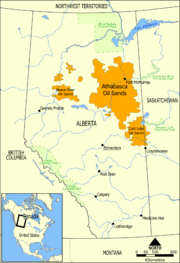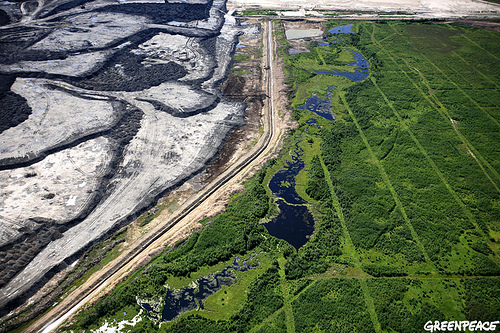Can Canada Move Past Their Dirty Secret?
Posted on 06. Oct, 2009 by Adam MacIsaac in Canada
After having some time to reflect on the meeting last week with Yvo de Boer the current Executive Secretary of the United Nations Framework Convention on Climate Change and having one quote echo in my head I could not pass on writing about the topic since it really holds weight to the current Canadian context and the slow progress that has been made so far in Bangkok.

Oil sands, also known as tar sands, or extra heavy oil, is a type of bitumen deposit. The sands are naturally occurring mixtures of sand or clay, water and an extremely dense and viscous form of petroleum called bitumen. They are found in large amounts in many countries throughout the world, but are found in extremely large quantities in Canada and Venezuela.
“Stop Financing The Past & Start Financing The Future.”
Yvo de Boer
While there has been a large growing amount of domestic pressure as well as international pressure to stop the one of the worlds largest represent as much as two-thirds of the world’s total petroleum resource, with at least 1.7 trillion barrels (270×10^9 m3) in the Canadian Athabasca Oil Sands.
One might wonder how could there ever be a serious climate change policy from Canada while they are the largest supplier of crude oil and refined products to the United States, supplying about 20% of total U.S. imports, and exporting more oil and products to the U.S. than it consumes itself. In 2006, Canadian bitumen production averaged 1.25 million barrels per day (200,000 m³/d) through 81 oil sands projects, representing 47% of total Canadian petroleum production. This proportion is expected to increase in coming decades as bitumen production grows while conventional oil production declines.
© Jiri Rezac / GREENPEACE
© Jiri Rezac / GREENPEACE
© Jiri Rezac / GREENPEACE

© Jiri Rezac / GREENPEACE
© Jiri Rezac / GREENPEACE
© Jiri Rezac / GREENPEACE
While it will not be easy for Canada move past this temporary barrier of moving past the Kyoto targets and the environmental impacts of the projects in Alberta will be a slow process to recover from. The need to focus on mitigation and the use of clean energy to exceed the emission targets it is something that is required to prevent much of the climate impacts that are currently happening around the world from having great impacts to Canada’s natural environment and economy.










Excellent stuff. Keep it up, friend.